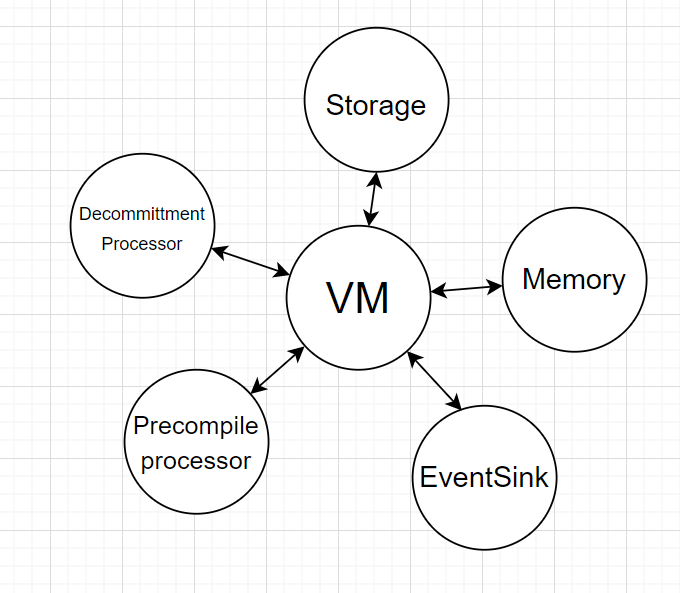Library EraVM.Introduction
This is the specification of the instruction set of EraVM 1.4.1, a language virtual machine for zkSync Era. It describes the virtual machine’s architecture, instruction syntax and semantics, and some elements of system protocol.
Table of contents
Overview
- Glossary : a list of all important recurring terms and notations defined in this document.
- ArchOverview : a bird’s eye overview of EraVM architecture with links to more detailed descriptions of its parts.
- PrimitiveValue : defines a tagged 256-bit word datatype; can be an integer or a pointer.
EraVM Structure
StateDefinitions collects all system state, persistent and transient.
- Registers : a group of isolated read/write memory cells available to all instructions.
- Flags : special registers showing the status of the latest computations.
- Predication : how setting flags makes EraVM skip of execute instructions.
- Memory : transient memory (heap, stack) for supporting computations and persistent storages of contracts.
- PointerDefinitions : definition of pointers to transient memory and operations on them.
- Slices : how individual pointers are restricted to selected subranges of memory addresses.
- Callstack : states of running functions and contracts.
- MemoryContext : how new transient memory is allocated when a contract is called.
Instruction Set
Addressing : how instructions can refer to their arguments.
Resolution : how instruction arguments are resolved to the operand values.
InstructionSets : overview of all layers of instruction set and their relations.
- Modifiers : recurring modifiers supported by many instructions: mod_set_flags and mod_swap.
- AssemblyInstructionSet : instruction set exposed to assembly programmers.
- CoreInstructionSet : simplified instruction set used to define instruction semantic.
- MachInstructionDefinition : layout of encoded assembly instructions.
- Conversions between instruction sets: asm_to_core and asm_to_mach.
EraVM operation
Ergs : resource/gas system and basic operation costs.
MemoryOps : precise formalization of memory writes and reads.
MemoryForwarding : a mechanism to pass memory slices between contracts.
Events : different types of events emitted when EraVM is operating.
KernelMode : privileged mode of execution for system contracts allowing a restricted part of the instructions set.
StaticMode : mode of execution with limited effects on persistent state.
SmallStep : formal semantics of instruction execution cycle, in small-step operational style
Panics : a mechanism of signaling irrecoverable errors and a list of situations where they occur.
Instruction set semantic
Stack manipulation
SpAdd: SpAddDefinition : forward stack pointer.SpSub: SpSubDefinition : rewind stack pointer.
Arithmetic
Add: AddDefinition :Sub: SubDefinition :Mul: MulDefinition :Div: DivDefinition :
Bitwise logical
And: AndDefinition :Or: OrDefinition :Xor: XorDefinition :
Bitwise shifts
Shl: ShlDefinition : left logical shift.Shr: ShrDefinition : right logical shift.Rol: RolDefinition : left circular shift.Ror: RorDefinition : right circular shift.
Control flow
Nop: NoOpDefinition : do nothing.Jump: JumpDefinition : jump to code (conditional jumps are implemented through Predication).NearCall: NearCallDefinition : call a function in the same contract.Ret(from near call) : NearRetDefinition : when used after near call, normal return to the call location, also returning unspent ergs.Revert(from near call) : NearRevertDefinition : when used after near call, return from near call due to a recoverable error, return unspend ergs, roll back storage/events, execute exception handler.NearRetTo: NearRetToDefinition : LikeRetbut returns to explicit label.NearRevertTo: NearRevertToDefinition : likeNearRevertbut executes code at label instead of exception handler.Panic: PanicDefinition : trigger panic.NearPanicTo: NearPanicToDefinition : trigger panic and return to label.Farcall: FarcallDefinition : call a contractRet(from far call) : FarRetDefinition : when used after far call, normal return to the call location, also returning unspent ergs.Revert(from far call) : FarRevertDefinition : when used after far call, recover (from an error), return unspend ergs, roll back storage/events, execute exception handler.
Operations with heaps
LoadPtr: LoadPtrDefinition : load word by a fat pointer.LoadPtrInc: LoadPtrIncDefinition : likeLoadPtr, additionally return an incremented pointer.Load: LoadDefinition : load word from heap by a fat pointer.LoadInc: LoadIncDefinition : likeLoad, additionally return offset+32.Store: StoreDefinition : store word to heap by an offset.StoreInc: StoreIncDefinition : likeStore, additionally return offset+32.
Operations with static memory page (unique “heap”-like unbound page, kernel-only)
StaticRead: StaticReadDefinition : load word from heap by a fat pointer.StaticReadInc: StaticReadIncDefinition : likeLoad, additionally return offset+32.StaticWrite: StaticWriteDefinition : store word to heap by an offset.StaticWriteInc: StaticWriteIncDefinition : likeStore, additionally return offset+32.
Operations with pointers
PtrAdd: PtrAddDefinition : increment pointer.PtrSub: PtrSubDefinition : decrement pointer.PtrShrink: PtrShrinkDefinition : restrict the range of addresses that a pointer can reference.PtrPack: PtrPackDefinition : put data in the unused high 128 bits of a pointer.
Operations with storage
SStore: SStoreDefinition : store value at a key in storage of the current contract.SLoad: SLoadDefinition : load value by key from storage of the current contract.
Operations with transient storage (resets after each transaction)
TransientStore: TransientStoreDefinition : store value at a key in transient storage of the current contract.TransientLoad: TransientLoadDefinition : load value by key from transient storage of the current contract.
Events and precompiles
OpEvent: OpEventDefinition : emit an event.ToL1: ToL1Definition : emit a message to L1.PrecompileCall: PrecompileCallDefinition : call an extension of VM specific to currently executing system contract.Context: ContextDefinition : access the context register and context captured value (used to emulatemsg.value).Contract: ContractDefinition : access associated contract addresses (current, caller, or code)VM: VMDefinition : access some parts of VM execution state such as stack pointer.
ABI (memory layouts of compound data structures serialized to 256-bit words.)
- Coder : general definitions of encoding, decoding, composition and required properties.
- NearCallABI
- FatPointerABI
- FarCallABI
- FarRetABI
- MetaParametersABI : layout of result of ContextMeta.
- PrecompileParametersABI : layout of result of ContextMeta.
Instruction encoding
- EncodingTools : binary encoding of different parts of instruction layout.
- encode_opcode : encoding source/destination, addressing modes, and all modifiers as a single 11-bit opcode value.
- MachEncoder : the main assembly instruction encoder definition.
Elements of protocol
- Bootloader : a system contract in charge of block construction.
- Precompiles : extensions of virtual machine.
- VersionedHash : used to fetch the contract code.
- Decommitter : fetches the contract code.
